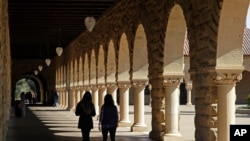International students in the U.S. whose studies and immigration status have undergone changes during President Donald Trump’s administration say they hope their stays will stabilize with President-elect Joe Biden.
“I do believe that ... international students would feel more secure here in the U.S. while pursuing their degrees,” said Ukrainian Roman Ivasiy, a student at Georgia State University. “Especially during the COVID crisis, when most of the programs switched to the online format.”
The COVID pandemic has shut down college and university campuses across the U.S. since March, leaving foreign students in limbo and in jeopardy of losing their student visa status.
“I’m hopeful that travel would be more convenient, with less hurdles to jump over, a more streamlined process that does not discourage visa application especially after graduation,” said Jehan Ayesha-Wirasto from Malaysia.
The Trump administration threatened to limit the Optional Practical Training, or OPT program, that allowed foreign students an extended visa to stay in the United States for up to three years after graduation. It is popular among science, technology, engineering and math students who want to remain in the U.S. after OPT on H-1B work visas.
“Following the U.S. elections has been extremely stressful,” said Mariana C., a Brazilian international student at Cornell University, who said she feared retaliation for revealing her full name. “It’s really disheartening not to be able to participate in a decision that will inevitably affect me as someone who spends most of the year in the U.S.”
International students faced multiple student visa rule changes this year under the Trump administration, which left millions uncertain if they could continue their studies without interruption.
In September, the Homeland Security Department proposed a new rule limiting F or J student visas to a fixed four-year term, despite many study programs lasting longer than that.
The rule would limit student visas to a fixed two-year term if students were from a country with a visa overstay rate above 10% or on a U.S. State Department’s State Sponsor of Terrorism list.
In August, Immigration and Customs Enforcement announced a rule that would compel international students enrolled in online-only courses at U.S. universities and colleges to be on campus during a pandemic or risk deportation. The rule was rescinded a week later after facing sharp backlash from universities and students.
Trump also issued an executive order in May banning Chinese graduate students from entering the country, saying they illegally acquire intellectual property from the United States.
“Trump’s multiple attempts to limit international students’ rights was stressful,” said Anna Shchetinina, a Russian student at the University of Minnesota. “However, I realize that during a Biden’s era relationships between Russia and the USA might get even more complicated” because of tension between the two countries.
“We, as Fulbrights, have a privilege, as we are directly sponsored by the Department of State,” said Jose A. Almodovar, 28, a Dominican student studying at Washington State University in Pullman, Washington. “But many international students are not, and they live in fear that at some point their visa privileges will be terminated under President Trump for no reason whatsoever.”
“Concessions were only given to international students this semester because of a push from big universities to allow for flexibility due to the extenuating circumstances and uncertainty created by the pandemic,” said Mariana C.
“I'm scared that if Trump [is] re-elected, this same push from universities won’t be enough to keep the government pliant to the needs of the international student community,” she added before Biden was projected as president-elect.
“All I feel as an international student right now is relief,” tweeted Payel Paul, a biology graduate student at Indiana University-Bloomington. “Hopefully I will be able to continue the rest of my Ph.D. in peace, without the stress and fear of uncertainty hanging over my head. I will always be immensely thankful to the IUBiology faculty for always having our backs.”
All I feel as an international student right now is relief. Hopefully I will be able to continue the rest of my PhD in peace, without the stress and fear of uncertainty hanging over my head. I will always be immensely thankful to the IUBiology faculty for always having our backs. https://t.co/xGZF0ZrfRC
— Payel Paul (@PayelPa29000577) November 8, 2020
Some students shared that they do not expect a big change in student visa policies or international student status.
“I honestly think Biden is going to be more moderate, but won't do a positive radical change in the visa system. So, his administration is going to be less xenophobic but won't also dramatically change visas to be in favor of international students here,” said Mohamed Badawy, 26, an Egyptian student at Stony Brook University in Stony Brook, New York.
“Maybe it'd have been different had not COVID hit. But he got a lot on his plate to deal with now, if he wins. If he doesn't, Trump would make the visa situation harder and difficult,” Badawy added.
“For me, as for a public health student, it's preferable to see someone in the office who does not discredit the work of public health experts across the country and respects scientific expertise applied to fight the pandemic,” Ivasiy said.
“I hope federal funds will include financial aid for international students as well,” Ayesha-Wirasto said. International students are eligible for private loans, not federal aid, and little other financial aid. More than 60% of foreign students pay their tuition and fees out of pocket, according to the Institute for International Education.







